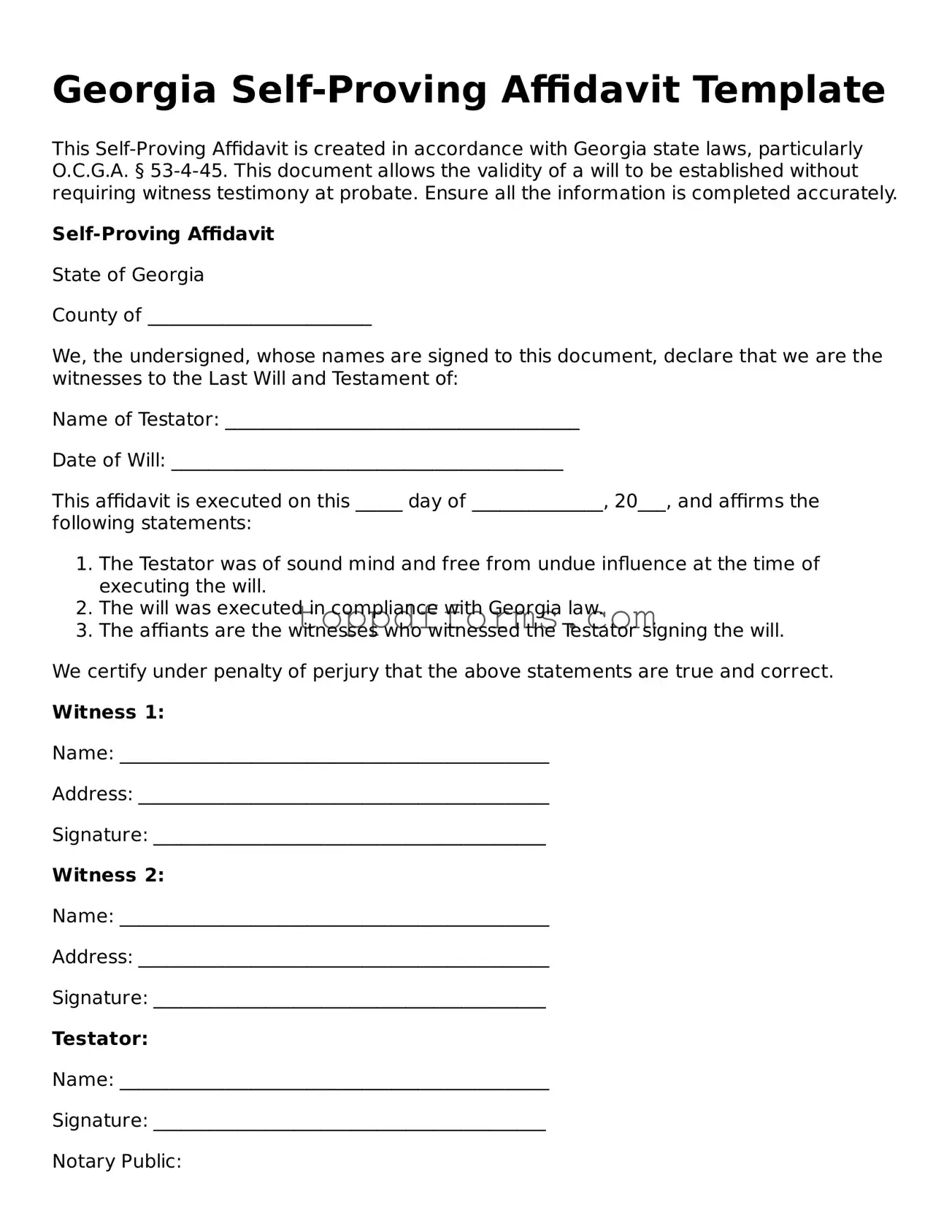Self-Proving Affidavit Document for Georgia State
Things You Should Know About This Form
What is a Georgia Self-Proving Affidavit?
A Georgia Self-Proving Affidavit is a legal document that allows a testator's will to be validated without the need for witnesses to testify in court after the testator's death. This affidavit is typically signed by the testator and witnesses in the presence of a notary public. By including this affidavit with the will, the probate process can be streamlined, making it easier for the executor to carry out the wishes of the deceased.
Why should I use a Self-Proving Affidavit?
Using a Self-Proving Affidavit can save time and reduce complications during the probate process. When a will is self-proving, the court accepts it as valid without requiring witnesses to appear and testify about the testator's intentions. This can help avoid potential disputes among heirs and simplify the administration of the estate, ensuring that the testator's wishes are honored efficiently.
What are the requirements for a Self-Proving Affidavit in Georgia?
To create a valid Self-Proving Affidavit in Georgia, the document must be signed by the testator and at least two witnesses. All parties must be present at the same time when signing the affidavit. Additionally, a notary public must acknowledge the signatures. The affidavit should be attached to the will to ensure it is considered valid during probate proceedings.
Can I create a Self-Proving Affidavit after my will is already signed?
Yes, you can create a Self-Proving Affidavit even after your will has been signed, as long as you and your witnesses are available to sign it in the presence of a notary. It is important to attach the Self-Proving Affidavit to the original will to ensure it is recognized during the probate process. Keep in mind that it’s best to consult with a legal professional to ensure all requirements are met properly.
Is a Self-Proving Affidavit necessary for my will to be valid in Georgia?
No, a Self-Proving Affidavit is not necessary for a will to be valid in Georgia. A will can still be legally binding without it. However, including a Self-Proving Affidavit can facilitate the probate process and reduce the likelihood of challenges to the will. It is a useful tool for ensuring that the wishes of the testator are carried out with minimal complications.
PDF Overview
| Fact Name | Description |
|---|---|
| Purpose | The Georgia Self-Proving Affidavit allows a will to be validated without requiring witnesses to appear in court. |
| Governing Law | This form is governed by O.C.G.A. § 53-4-48, which outlines the requirements for self-proving wills in Georgia. |
| Signatures Required | The affidavit must be signed by the testator and two witnesses in the presence of a notary public. |
| Benefits | Using this affidavit simplifies the probate process and can expedite the validation of the will. |
| Filing | While it is not required to file the affidavit with the will, having it can prevent potential disputes over the will's validity. |
Common mistakes
When completing the Georgia Self-Proving Affidavit form, individuals often overlook critical details. One common mistake is failing to include the correct names of the witnesses. It is essential that the full names of both witnesses are clearly stated. If the names are misspelled or incomplete, it can lead to complications in validating the will.
Another frequent error involves not having the witnesses sign the affidavit in the presence of the testator. The law requires that the testator and the witnesses sign together at the same time. If this step is skipped, the affidavit may be deemed invalid. Ensuring that all parties are present during the signing is crucial for the document's legitimacy.
People also sometimes neglect to date the affidavit properly. The date is important as it indicates when the affidavit was executed. If the date is missing or incorrect, it could create confusion about the timing of the will's validity. Always double-check that the date is accurate and clearly written.
Lastly, individuals might forget to have the affidavit notarized. A notary public's signature and seal are necessary for the affidavit to be considered self-proving in Georgia. Without this notarization, the document may not hold up in court. Remember to arrange for a notary to be present during the signing process to avoid this pitfall.
Other Common State-specific Self-Proving Affidavit Forms
Free Florida Affidavit Template - It is advisable for individuals to create a Self-Proving Affidavit as part of their estate planning process.
When navigating a divorce in Florida, utilizing the Florida Divorce Settlement Agreement form is crucial for both parties to clearly outline their expectations. This legal document ensures a fair division of assets, debts, and responsibilities, minimizing potential disputes. For those seeking a template or additional guidance, resources like floridaformspdf.com/printable-divorce-settlement-agreement-form can be invaluable.
Texas Self Proving Affidavit - The form outlines important details about the creation of the will.
